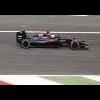-no mandatory use of compounds
I think the mandatory use is essential for the whole compound thing to work. We would see a lot of weekends when many/most/all teams use only one compound for the race, which means less variation of strategies, which means the pace differences would be more or less fixed for the whole of the race --> dull.
-no fuel limits
Racing-wise, I can't think of many negatives but the positives likely wouldn't be all that visible either. It has more to do with cars going around faster in general, I think. No lifting and coasting etc.
-no engine and gearbox limits
Less penalties and less need for protecting the engines with less powerful engine modes etc. Maybe less "racing" as everybody would run the machinery at 100% (removes the risk of having to run the engine at lower levels than the competition).
-more tyres for the weekend
Wouldn't make much of a difference really. They're not gonna do that many more pit-stops in the race anyway even with unlimited tires so it's more of a matter of removing the risk of not having fresh sets for every stint or something like that.
-what HAM said in the last sentence: try a race with no tyre changes.
Didn't they try this in 2005 or something? Not sure the effect was positive, more of an engineering challenge for tire manufacturers (see Indy -05). In the non-refueling era, it means no pit-stops whatsoever which would probably make some, if not most, of the races majorly dull.
-given technical and safety feasability, I'd be even open to a change of front wings during the long break.
Do you mean giving them more freedom in terms of the technical regulations? Difficult to predict the results were that to happen, could lead to one team having even more of an edge over the rest than what Merc has now. Obviously, from that team's perspective, it would be earned but from the spectator's perspective, dull.
-Hamilton's proposal of experimenting with the weekend format: sprint/feature races, super race weekends, heats, different format each week.
No. Just no.










































